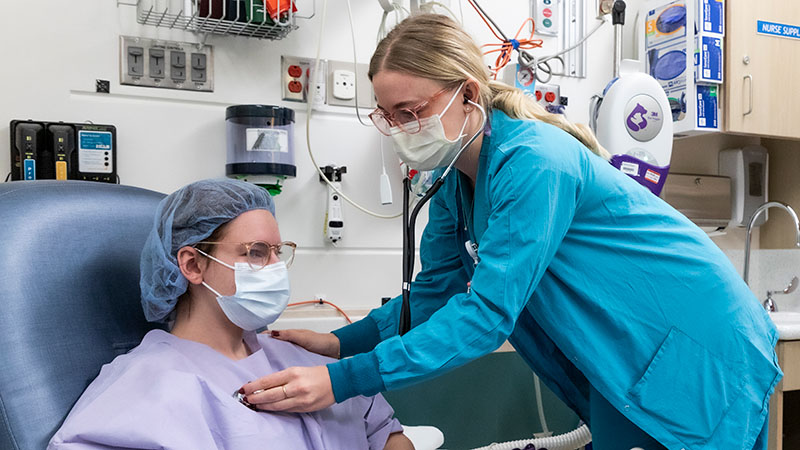What is a dermoid cyst?
Dermoid cysts are closed sacs that form in or on the skin. They may contain fluid or pus. Dermoid cysts are common.
Most often, they are on the face, scalp or upper chest. These cysts sometimes extend below the skin and may grow into the bone. Very rarely, they grow inside the body.
A dermoid cyst is present at birth. But it may be years before you notice it because they grow slowly. Dermoid cysts do not go away on their own. They may get bigger with time or become infected. It is easier to remove cysts and prevent scars before the cyst gets infected.
-
What causes dermoid cysts?
Dermoid cysts develop before birth. They happen if skin cells and things like hair, sweat glands, oil glands or fatty tissue get trapped in the skin.
Pediatric General and Thoracic Surgery at Seattle Children's
Symptoms of Dermoid Cysts
In most cases, the only dermoid cyst symptom is a small, painless lump under the skin. The lump may be the same color as your child’s skin, or it may be pale yellow.
Dermoid cysts usually show up:
- Near the eyebrow
- On the scalp
- On the chest
- Over the collarbone
If a dermoid cyst gets infected, it may:
- Hurt
- Become swollen and red
- Burst
The infection may cause a fever.
Diagnosing Dermoid Cysts
Our doctors will:
- Check your child
- Feel the lump
- Ask questions, such as when you first saw the lump and how fast it has grown
Sometimes a child needs tests to see how deep their cyst goes into the body and if it connects to other tissues. These tests include:
- CT (computed tomography) scan
- MRI (magnetic resonance imaging)
Treating Dermoid Cysts
Most often, surgeons remove dermoid cysts to prevent infection. If a cyst is inside your child’s body or growing into a bone, we remove it to make sure it is not cancerous.
We can plan the surgery to fit your schedule. Most often, your child can go home on the same day as the surgery.
Members of our Pediatric General and Thoracic Surgery team will do the surgery. Depending on where the cyst is, plastic surgeons or neurosurgeons may take part in the procedure.
-
Before surgery
Before surgery, we will give your child medicine to sleep and not feel pain (general anesthesia). Our anesthesiologists have extra training in how to give pain medicine to children to keep surgeries as safe as possible.
-
During surgery
The surgeon will:
- Make a small cut (incision) in the skin over the cyst
- Remove the cyst
- Sew the cut to close it
If the cyst is on your child’s face or scalp, the surgeon can often hide the cut in the hairline or eyebrow. The surgery takes about 30 minutes.
-
After surgery
Your child will be in the recovery room for an hour after the surgery. We will give them pain medicine for comfort.
Before you leave the hospital, we will teach you:
- What to give your child at home for pain
- How to care for the incision by keeping it clean and dry
- Any limits on your child’s activities while they heal
Your child will see the surgeon for a follow-up visit about 2 to 3 weeks after surgery. The surgeon will make sure the incision is healing.
Our providers and nurses are always here to answer your questions.
Dermoid Cysts at Seattle Children’s
Our pediatric surgery team is one of the most experienced in the nation, with excellent outcomes. Contact our Pediatric General and Thoracic Surgery Department at 206-987-2794 for an appointment, second opinion or more information.
-
The experts you need are here
- Our Pediatric General and Thoracic Surgery team sees many children of all ages with these cysts.
- We are experienced in removing dermoid cysts wherever they are.
- Because our surgeons have done so many cases, they have greater skill and can best decide when surgery is needed. This leads to better outcomes.
-
Specialists in caring for kids
- Our doctors focus on how today’s treatment will affect your child as they develop and become an adult. We base care plans on years of experience and the newest research on what works best for children and teens.
- Your child needs treatment designed for them. Children differ from adults in how they react to illness, medicine or surgery. That’s why our surgeons are all board certified in pediatric surgery.
- How your child’s pain is managed is key to their healing. Seattle Children’s has the largest team of anesthesiologists who treat only children.
-
Support for your whole family
- At Seattle Children’s, your family has a full team behind you, specially trained to work with children and their families. Our facilities and equipment also reflect this kid-friendly, family-centered approach.
- Our doctors and nurses will give you full instructions on how best to care for your child after surgery. We are always here to answer your questions.
- At Seattle Children's, we work with many children and families from around the Northwest and beyond. We can help with financial counseling, transportation and interpreter services. Read about our services for patients and families.
Contact Us
Contact our Pediatric General and Thoracic Surgery Department at 206-987-2794 for an appointment, second opinion or more information.
To make an appointment, you can call us directly or ask your child’s primary care provider to refer you. We encourage you to coordinate with your primary care provider when coming to Seattle Children’s.
We have clinics in Bellevue, Everett, Federal Way, Seattle and Tri-Cities. Most often, surgery to remove cysts takes place at our Bellevue Clinic and Surgery Center.
Providers, see how to refer a patient.

